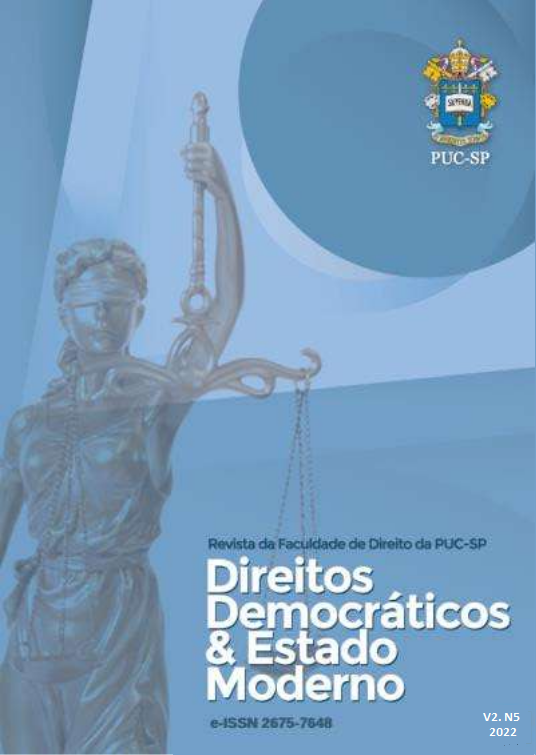extrajudicial activity and the general data protection law
the limits of registration advertising
DOI:
https://doi.org/10.23925/ddem.v.2.n.5.58360Keywords:
Information, General data protection law, Extrajudicial services, Privacy, Civil responsibilityAbstract
This article investigates the theme of the General Data Protection Law and its impacts on extrajudicial services. From an exploratory perspective, combined with the appropriation of the qualitative approach, the methodological procedures adopted contributed to the understanding of the Law as a limiting factor to the provision of information that must be provided by the Servants, indicating the point at which such elements converge in the scope of the theme now addressed. With an exploratory bias, combined with the appropriation of qualitative approaches, using the bibliographic and jurisprudential review, with doctrinal research, in articles, legislation and judicial decisions, the method used sought to contemplate arguments and legal support that demonstrate the need to provide such information , with a view to complying with legality, addressing the publicity of registration, evidencing the responsibility of the notary and registrar for possible violations of data formerly entrusted in the exercise of their attributions.
References
BAEZ, Narciso Leandro Xavier et al (org.). O impacto das novas tecnologias nos direitos fundamentais. Joaçaba: Unoesc, 2018. 511 p. Disponível em: https://www.unoesc.edu.br/editora/livros-single/e-book-gratuito-o-impacto-das-novas-tecnologias-nos-direitos-fundamentais. Acesso em 20 dez. 2021.
BLASCO, Fernando Domingos Carvalho. Manual notarial e registral de prevenção à lavagem de dinheiro e ao financiamento do terrorismo. São Paulo: 2019. Disponível em: https://cartorioblasco.com.br/Content/publicacoes/Manual_Notarial_e_Registral_de_Prevencao_a_Lavagem_de_Dinheiro_e_ao_Financiamento_do_Terrorismo.pdf. Acesso em 28 dez. 2021.
BRASIL. Lei 9.492, de 10 de setembro de 1997. Disponível em: http://www.planalto.gov.br/ccivil_03/leis/l9492.htm. Acesso em 20 dez. 2021.
BRASIL. Supremo Tribunal Federal. Recurso Extraordinário 842.846/SC, Relator Min. Luiz Fux, acórdão publicado em 13/08/2019.
BRASIL. Lei 6.015, de 31 de dezembro de 1973. Disponível em: http://www.planalto.gov.br/ccivil_03/Leis/L6015compilada.htm. Acesso em 20 dez. 2021.
BRASIL. Lei 8.935, de 18 de novembro de 1994. Disponível em: http://www.planalto.gov.br/ccivil_03/Leis/L8935.htm. Acesso em 11 dez. 2021.
BRASIL. Lei 13.709 de 14 de agosto de 2018. Disponível em: https://www.planalto.gov.br/ccivil_03/_ato2015-2018/2018/lei/l13709.htm. Acesso em 20 dez. 2021.
CENEVIVA, Walter. Lei dos notários e dos registradores comentada. 9. ed. São Paulo: Saraiva, 2014.
FREDES, Andrei Ferreira; BORGES, Mariana Godinho. Dados pessoais, privacidade e democracia: uma relação contemporânea necessária. Revista Direitos Democráticos & Estado Moderno. Faculdade de Direito da PUC-SP, Nº. 02, p.181-195, Jan./Jun. 2021.
HERNÁNDEZ GIL, F. Introducción al derecho hipotecario. Madrid: Revista de Derecho Privado, 1963. v. 3.
KÜMPEL, Vitor Frederico et al. Tratado Notarial e Registral. vol. 5. 1. ed. São Paulo: YK Editora, 2020.
LOUREIRO, Luiz Guilherme. Registros Públicos: teoria e prática. 8. ed. Salvador: Editora Juspodivm, 2017.
NASCIMENTO, Irley Carlos Siqueira Quintanilha; VARELLA, Marcelo Dias. Tabeliães e registradores nos arranjos institucionais de políticas públicas brasileiras de desjudicialização. Direito, Estado e Sociedade, [s. l.], n. 51, p. 109–134, 2017. Acesso em 21 dez. 2021.
NUNES, Pedro. Dicionário de tecnologia jurídica. 13. ed. São Paulo: Renovar, 1999.
ONU. Pacto de São José da Costa Rica, 1978. Disponível em: http://www.planalto.gov.br/ccivil_03/decreto/d0678.htm Acesso em 21/06/2022.
SILVA, De Plácido e Vocabulário Jurídico / atualizadores: Nagib Slaibi Filho e Priscila Pereira Vasques Gomes – 31. ed. – Rio de Janeiro: Forense, 2014.
TARTUCE, Flávio. Manual de direito civil: volume único. 10. ed. – Rio de Janeiro: Forense; São Paulo: MÉTODO, 2020.
Downloads
Published
How to Cite
Issue
Section
License
Copyright (c) 2022 Democratic Rights & Modern State

This work is licensed under a Creative Commons Attribution 4.0 International License.
This work is licensed under a License Creative Commons Atribuição 4.0 Internacional.
The authors grant the journal all copyrights relating to the published works. The concepts issued in signed articles are the absolute and exclusive responsibility of their authors.
DD&EM Magazine - ISSN 2675-7648

















